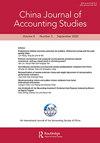儒家文化与会计保守主义:来自中国的证据
Q4 Business, Management and Accounting
引用次数: 2
摘要
摘要本研究探讨儒家文化对会计稳健性的影响。以2001-2017年的中国上市公司为样本,我们的研究结果表明,儒家文化(以公司周围特定半径内的孔庙(学校)数量衡量)与会计稳健性显著正相关,这表明儒家伦理和文化促进了会计稳健性。此外,诉讼风险削弱了儒家文化对会计稳健性的积极作用。上述发现对于使用儒家文化和会计保守性替代代理的各种敏感性测试是稳健的。此外,在使用工具变量(IV)两阶段回归方法和差分模型方法解决内生性问题后,我们的主要结论仍然成立。最后,儒家文化对会计稳健性的积极影响仅对非四大审计事务所、管理层持股比例较低的事务所和竞争激烈的行业的事务所有效。本文章由计算机程序翻译,如有差异,请以英文原文为准。
Confucian culture and accounting conservatism: evidence from China
ABSTRACT This study investigates the influence of Confucian culture on accounting conservatism. Using a sample of Chinese-listed firms during the period of 2001–2017, our findings reveal that Confucian culture, measured as the number of Confucian temples (schools) within a specific radius around a firm, is significantly positively associated with accounting conservatism, suggesting that Confucian ethics and culture promote accounting conservatism. Moreover, litigation risk attenuates the positive effect of Confucian culture on accounting conservatism. The above findings are robust to a variety of sensitivity tests using alternative proxies for Confucian culture and accounting conservatism. Furthermore, our main conclusions still stand after using the instrumental variable (IV) two-stage regression method and the differential model approach to address the endogeneity issue. Lastly, the positive effect of Confucian culture on accounting conservatism is only valid for non-BIG4-audited firms, firms with lower managerial ownership and firms in highly competitive industries.
求助全文
通过发布文献求助,成功后即可免费获取论文全文。
去求助
来源期刊

China Journal of Accounting Studies
Business, Management and Accounting-Business, Management and Accounting (all)
CiteScore
0.70
自引率
0.00%
发文量
19
审稿时长
6 weeks
 求助内容:
求助内容: 应助结果提醒方式:
应助结果提醒方式:


